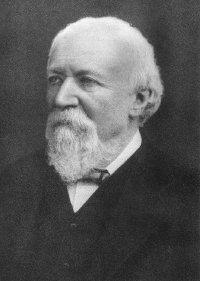Robert Browning

House
1
Shall I sonnet-sing you about myself?
Do I live in a house you
would like to see?
Is it scant of gear, has it store of pelf?
“Unlock my heart with a
sonnet-key?”
2
Invite the world, as my betters have done?
“Take notice: this building
remains on view,
Its suites of reception every one,
Its private apartment and
bedroom too;
3
“For a ticket, apply to the Publisher.”
No: thanking
the public I must decline.
A peep through my window, if folk prefer;
But, please you, no foot
over threshold of mine!
4
I have mixed with a crowd and heard free talk
In a foreign land where
an earthquake chanced;
And a house stood gaping, naught to balk
Man’s eye wherever he gazed
or glanced.
5
The whole of the frontage shaven sheer,
The inside gaped: exposed
to day,
Right and wrong and common and queer,
Bare, as the palm of your
hand, it lay.
6
The owner? Oh, he had been crushed, no doubt!
“Odd tables and chairs
for a man of wealth!
What a parcel of musty old books about!
He smoked—no wonder he
lost his health!
7
“I doubt he bathed before he dressed.
A brazier?—the pagan, he
burned perfumes!
You see it is proved, what the neighbours
guessed:
His wife and himself had
separate rooms.”
8
Friends, the goodman of the house at least
Kept house to himself till
an earthquake came:
‘Tis the fall of its frontage permits you
feast
On the inside arrangement
you praise or blame.
9
Outside should suffice for evidence:
And whoso desires to penetrate
Deeper, must dive by the spirit sense—
No optics like yours, at
any rate!
10
“Hoity toity! A street to explore,
Your house is the exception!
‘With this same key
Shakespeare unlocked his heart,’ once more”
Did Shakespeare?
If so, the less Shakespeare he!
I could find no text of this poem
on the web, so I decided to post it myself.
I hope those of you who come to this page enjoy
this late poem ( 1876) of Robert Browning. I find it remarkable.
Unlike much of his poetry, which was written in the dramatic monologues
he helped create, this poem comes rather directly from its author.
Ironically, its subject is a defense of not being direct: of charting a
different course from those who write about their innermost feelings, as
Romantic and more recently confessional poets do, and thus expose their
inner life to the reader.
Here’s what I like about the poem:
· It has a wonderful verve that we associate with much
of Browning, and is filled with questions, exclamations, stupidities (the
vapid comments of the passers-by) and that wonderful “Hoity toity” in the
last stanza. And it even ends up criticizing Shakespeare (Browning
is responding to Wordsworth’s line in “Scorn not the Sonnet” where Wordsworth
writes, “With this same key Shakespeare unlocked his heart.”
· Browning is ever the ironist. Even that last line criticizing
Shakespeare is ironic, since the greatest poetry of Shakespeare is his
plays, which present the world dramatically, its exterior actions and characters,
and not in some ‘exposure’ of Shakespeare’s heart. And doubly ironically,
since from their writing until today, no one really can see into what was
in Shakespeare’s heart in the sonnets: we still are not entirely sure what
was inside Shakespeare’s heart when he wrote those poems – or even to whom
he was writing them!
· That great metaphor, of the house wall torn away by earthquake,
and all the folks in the crowd peeping, gaping at the gaping house, and
gossiping about the mess, the paganism and the marriage habits of
the just-dead owner.
· We live with surfaces: “Outside should suffice for evidence”
· We see with our imaginations, not our eyesight: we know what
is within another person by observing clearly and using our minds and hearts
and imagination – just as we do when we ‘listen’ to one of Browning’s monologues.
Browning’s poetic rhythms were justly acclaimed by the
modern poets – Ezra Pound above all. His reticence – his wanting
to avoid the “spontaneous overflow of powerful feelings” that Wordsworth
had called for – became a central guide for modernist poetry in England
and America. He taught them not to rip away the outer walls and let
their inner lives hang there for people to gape at: build a house and let
readers “penetrate deeper…dive by spirit-sense,” he said – and his example
showed them how.
A final word. I think Browning would, for all
his late celebrity, have empathized on very deep levels with his contemporary
Emily Dickinson:
I'm Nobody! Who are you?
Are you—Nobody—Too?
Then there's a pair of us!
Don't tell! they'd advertise—you know!
How dreary—to be—Somebody!
How public—like a Frog—
To tell one's name—the livelong June—
To an admiring Bog!
Also, another Browning text I have posted: Dis
Alter Visum; or The Byron de Nos Jours
To help out a friend and former student, Elliot Earle, I am putting
a web page link to his home page here. You can visit it if
you wish: he makes stone sculptures, and wonderful tables made of stone
and (!) water. Go to:
http://elliotearlesculpture.com/index.html